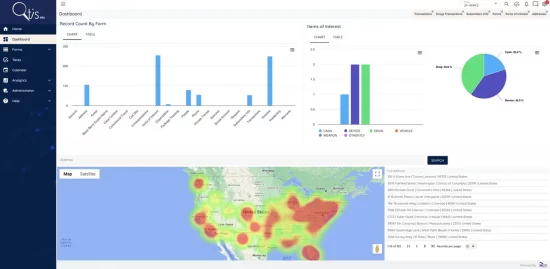Importance of data security in political campaigns
Data security in political campaigns is crucial to protect sensitive information from unauthorized access or cyber-attacks. The integrity of campaign data can significantly impact the outcome of an election, making it essential to safeguard against any potential threats. Potential risks include hacking, data breaches, and unauthorized access, which could compromise voter information, campaign strategies, and communication. Implementing robust data security measures is necessary to maintain the trust of the public, ensure the privacy of individuals, and safeguard the democratic process. Effective data security can also prevent manipulation of election results and maintain the transparency and credibility of political campaigns.

Risks and vulnerabilities in political data tools
Political data tools, such as voter databases and campaign management software, are susceptible to various risks and vulnerabilities. These tools often handle sensitive information, making them attractive targets for cyberattacks. Hackers may target these systems to steal, manipulate, or leak private data, which can have serious consequences for political campaigns and individuals involved. Organizations must prioritize the security of these tools to safeguard the integrity and confidentiality of political data.
Cybersecurity threats to political campaigns
Cybersecurity threats to political campaigns can involve a range of tactics, including hacking, phishing, and disinformation campaigns. According to the cybersecurity firm FireEye, malicious actors often target political campaigns with the intention of stealing sensitive data, disrupting operations, or spreading misinformation. These threats can compromise the integrity of elections and undermine public trust in the democratic process. It is crucial for political campaigns to prioritize cybersecurity measures to safeguard their data and protect against potential attacks.
Best practices for securing political data
To secure political data, it’s crucial to implement strong password policies, enable two-factor authentication for all accounts, and encrypt sensitive information. Regularly updating security software and conducting thorough background checks on staff handling data are also essential. Additionally, limiting access to data and regularly conducting security audits are vital measures for ensuring the safety and integrity of political information.
Legal and ethical considerations in political data security
Political campaigns must adhere to legal and ethical considerations when handling data security. It is important to understand the regulations and guidelines set forth by data privacy laws such as the General Data Protection Regulation (GDPR) and the California Consumer Privacy Act (CCPA). Campaigns must also consider the ethical implications of collecting, storing, and using personal data of voters, and ensure that they obtain consent for data usage. It is crucial to prioritize the protection of individuals’ sensitive information and to be transparent about the data security measures in place. Additionally, campaigns should have a clear plan for data deletion and ensure that they do not engage in unethical practices such as data manipulation or unauthorized data sharing.
Case studies of data breaches in political campaigns
Data breaches in political campaigns have been a serious concern in recent years. Several high-profile case studies have highlighted the vulnerabilities in data security within political campaigns. For example, the 2016 US presidential election saw multiple instances of data breaches, including the unauthorized access of voter databases and the dissemination of sensitive campaign information. Similarly, the 2017 French presidential election witnessed a data breach that exposed confidential campaign documents. These incidents underscore the need for robust data security measures in political campaigns to safeguard sensitive information from unauthorized access and exploitation.
Securing voter data and personal information
In political campaigns, securing voter data and personal information is crucial to maintaining trust and protecting individuals’ privacy. Here are some key points to consider:
- Voter data and personal information must be stored securely to prevent unauthorized access and potential breaches.
- Campaigns should implement robust security measures, such as encryption and access controls, to safeguard sensitive information.
- It is essential to comply with data protection laws and regulations to ensure the legal and ethical handling of voter data and personal information.
- Awareness and training for campaign staff on best practices for data security and privacy protection are vital to preventing potential vulnerabilities.
By prioritizing the security of voter data and personal information, political campaigns can uphold the integrity of the electoral process and maintain the trust of the public.
Technology solutions for political data security
Political campaigns are increasingly reliant on technology to manage and store large amounts of sensitive data. Implementing encryption for data at rest and in transit can ensure that information is secure from unauthorized access. Multi-factor authentication provides an additional layer of protection by requiring more than just a password to access sensitive systems. Regular security audits and penetration testing can help identify and address vulnerabilities in the technology infrastructure. Training campaign staff on best practices for data security can also mitigate the risk of data breaches.
Training and awareness for campaign staff
Political campaign staff should receive regular training and awareness sessions on data security best practices. This includes recognizing phishing attempts, creating and managing strong passwords, and understanding the importance of protecting sensitive information. Staff should also be educated on the potential risks of social engineering and the necessity of securely handling and storing data. Regular training and awareness will help ensure that all staff members are equipped to play their part in maintaining data security within the campaign.
Conclusion: The future of data security in political campaigns
As we conclude our review, it is clear that data security in political campaigns is a crucial issue that requires urgent attention. The future of data security in political campaigns needs to prioritize the implementation of robust and comprehensive measures to safeguard sensitive information. Campaigns must invest in advanced technologies and strict protocols to mitigate the risks of data breaches and cyber attacks. Additionally, there is a pressing need for legislative reforms and ethical guidelines to govern the collection, storage, and usage of voter data. Only through a concerted effort from political entities, technology experts, and regulatory bodies can we ensure the integrity and security of our democratic processes.




 520 838 0346
520 838 0346 sales@zinatt.com
sales@zinatt.com









